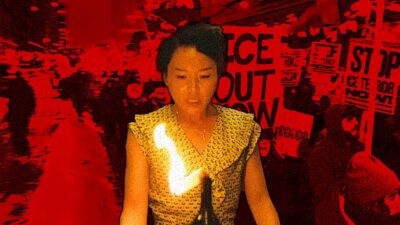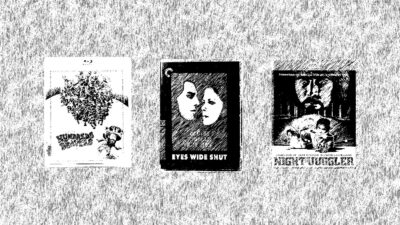When I was in middle and high school, I would obsessively listen to hot talk radio. “Free FM” as it was being billed in those days was a last-ditch effort, probably ultimately the last of its kind ever to hit terrestrial air waves in a major way. Clusters of stations around the US would flip to the hands of sports talk or Top 40 after failing to find success in the rapidly changing post-9/11 media landscape—Adam Carolla, Frosty, Heidi & Frank, Don and Mike, Opie and Anthony, and before his notable groundbreaking flip to Sirius, Howard Stern, lost names of a misogynistic brand of provocative shock jock radio.
Of those former titans, one will always stay with me: Tom Leykis, or “the professor,” as he would be called by listeners. In retrospect, THE TOM LEYKIS SHOW was both deeply troubling and extremely revealing; Leykis’ voice alone was a devilish, gripping presence, inimitably cartoonish and yet so broad and boarish that it would seem almost like parody to repeat some of the lines the way he would deliver them, a bluer, crueler brand of comedy. “The professor” had a central idea he’d return to. Listeners, often women, would call in and inquire as to why and how he’d been romantically involved with so many people despite his clear vitriol for the female gender writ large. And his answer always seemed to be the same: every woman thought they could fix him. That under a thick, chauvinistic skin, no matter how many times he revealed himself to be a fundamentally bad person, his four ex-wives and numerous girlfriends all believed there was something both redeemable and changeable.
If the media landscape I’m describing in any way seems unfamiliar, go throw on THE 40 YEAR OLD VIRGIN, director Judd Apatow’s debut that happened to also be released in 2005. You’ll find a lot of the same kinds of off-color language Leykis would use on air in that film, a similar kind of behind-closed-doors masculinity that certainly borders on what many would probably describe as “toxic.” While Leykis would broadly paint this kind of toxicity as a boys club, one that he, you, and everyone else listening was a part of, Apatow tried to keep it at arm’s length, meant for poker games after hours or playing video games with the bros. For better and worse, his debut is a sign of the times.
Certainly the rise of Apatow as a figurehead in Hollywood and his larger influence on comedy through both the 2000s and 2010s could point to far more important, interesting, and perhaps even influential works, but ultimately a conversation about his films has to begin and end with his first and, what many would describe, his best. It is with THE 40 YEAR OLD VIRGIN, but certainly many other films spanning the era, from ANCHORMAN: THE LEGEND OF RON BURGUNDY to FORGETTING SARAH MARSHALL (of which Apatow is a producer of), that THE TOM LEYKIS SHOW boys clubs were suddenly being painted as something that we could and likely should evolve beyond. Perhaps complicit in exploring toxic locker room talk by modern standards, the last 15 years of comedy has hinged on accepting that people can rise above toxic settings, be it a San Diego news desk or a big box electronics store. Seeing these boys clubs become self-aware was viewed as its own sense of heightened evolution.
Apatow’s work is obsessed with this sense of evolution; his films hypothesize that in some way, we as humans must undergo life-altering change to better ourselves. If THE 40 YEAR OLD VIRGIN works better than any of Apatow’s other works, it’s because the change itself is trivial—Andy’s (Steve Carrell) desire to have sex doesn’t exist as a moral quandry, and in fact his naivety in a lot of ways makes him a sweet character. The same could be said of Ben (Seth Rogen) in KNOCKED UP. Even though many of Apatow’s bad habits end up fostering this particular narrative, having a baby is ultimately the thing that forces our protagonist to become a better person.
Yet being a better person and being a good person are different. While both Ben and Andy are seeking betterment, inherently good people whose circumstances have demanded change, much of the rest of Apatow’s proper directorial career is riddled with bad people who are attempting to be good. At the core of FUNNY PEOPLE, TRAINWRECK, and his latest, THE KING OF STATEN ISLAND, are unlikable, sometimes morally bankrupt, characters with whom we are literally trapped, and whose attempted redemption arcs come too late or never account for their decisions. Women keep dating Tom Leykis despite a long track record saying it’s not a good idea, even by his own admission. To sit with characters whose own grasp on being good comes without any moral obligation or sense of what exactly “bad” is is oftentimes exhausting, and that Apatow refuses to make moves under 180 minutes doesn’t help his storytelling.
Love him or, as many do, hate him, there is something largely magnetic about Pete Davidson, something that cannot be denied. Perhaps it’s a love-to-hate him personality, perhaps for some there is a surreal sex appeal, but when I look at him I return to this idea Tom Leykis presents, that people just want to change him. Our investment in him as an actor, celebrity, or playboy is rooted in our own hapless sense of wanting him to change. Certainly both THE KING OF STATEN ISLAND and 2020’s other Pete Davidson star vehicle, BIG TIME ADOLESCENCE, are built around the idea that Davidson’s personality, grating as it may be, can be fixed, as though his tattooed, puppy eyed persona is simply waiting for a SCOOBY DOO mask reveal to show us a different side, be it as an actor or, in both films’ plots, as a character. But in Apatow’s examination, Davidson is a selfish, entitled burnout whose own enlightenment comes far after the audience has given up on him.
Davidson’s role in Apatow’s larger universe should indicate its own sea change for the director, his first time working with a millennial talent, and his first time attempting to work with an actor whose personality far precedes his work (perhaps Atatow’s own behind the scenes way of trying to fix something). In many ways, it should mark a moment for Apatow to explore a generational divide between the way masculinity looks from generation to generation—what better evolution to ultimately examine than the difference between what being in your 20s looked like in 2005 in THE 40 YEAR OLD VIRGIN and in 2020 in THE KING OF STATEN ISLAND? Tragically, the boys clubs in his films remain largely the same now as they did then, perhaps far less cruel or vulgar, but still pitching the idea that the fraught masculinity of the 2000s is as alive in 20-something weed-filled basements as it is in Gen X-populated firehouses. There is undoubtedly something interesting to explore in the way men interact with each other in 2020, yet it exists nowhere in THE KING OF STATEN ISLAND. While it’s clear living in 2020 that we haven’t progressed that much beyond 2005 as we may think, it’s fair to hope that Apatow’s filmmaking could have, and if beyond that, that masculine relationships detailed on screen could.
THE TOM LEYKIS SHOW went off the air officially in 2018 after his transitioned podcast ended, and while I haven’t heard his show since it left my local airwaves nearly a decade-and-a-half ago, I have to imagine it was still predicated on a sexist, toxic edgelord personality that never progressed much past the playground taunt “boys go to college to get more knowledge, girls go to Jupiter to get more stupider.” Certainly that kind of profane energy has left Apatow’s films, but the world has undeniably progressed beyond befuddled men looking for enlightenment to become morally redeemed, and I have to hope that the rest of comedy at some point finds a different, more modern narrative.
















Comments